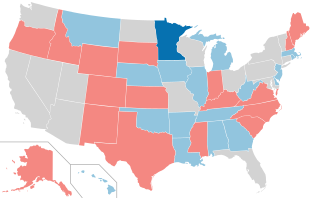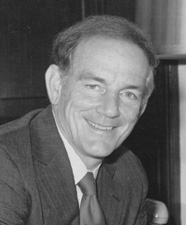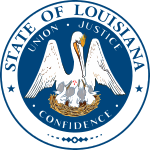
John Bennett Johnston Jr. is a retired American attorney, politician, and later lobbyist. A member of the Democratic Party, Johnston represented Louisiana in the U.S. Senate from 1972 to 1997.
Southern Democrats are affiliates of the U.S. Democratic Party who reside in the Southern United States.

The 1996 United States Senate elections were held on November 5, with the 33 seats of Class 2 contested in regular elections. Special elections were also held to fill vacancies. They coincided with the presidential election of the same year, in which Democrat Bill Clinton was re-elected president.

The 1990 United States Senate elections were held on Tuesday, November 6, 1990, with the 33 seats of Class 2 contested in regular elections. Special elections were also held to fill vacancies. The Democratic Party increased its majority with a net gain of one seat from the Republican Party. The election cycle took place in the middle of President George H. W. Bush's term, and, as with most other midterm elections, the party not holding the presidency gained seats in Congress.

The 1984 United States Senate elections were held on November 6, with the 33 seats of Class 2 contested in regular elections. They coincided with the landslide re-election of President Ronald Reagan in the presidential election. In spite of the lopsided presidential race, Reagan's Republican Party suffered a net loss of two Senate seats to the Democrats, although it retained control of the Senate with a reduced 53–47 majority. Democrats defeated incumbents in Illinois and Iowa, and won an open seat in Tennessee, while Republicans defeated an incumbent in Kentucky.

The 1972 United States Senate elections were held on November 7, with the 33 seats of Class 2 contested in regular elections. They coincided with the landslide re-election of Republican President Richard Nixon. Despite Nixon's landslide victory, Democrats increased their majority by two seats. The Democrats picked up open seats in Kentucky and South Dakota, and defeated four incumbent senators: Gordon Allott of Colorado, J. Caleb Boggs of Delaware, Jack Miller of Iowa, and Margaret Chase Smith of Maine. The Republicans picked up open seats in New Mexico, North Carolina, and Oklahoma, and defeated one incumbent, William B. Spong Jr. of Virginia.

The 1966 United States Senate elections were elections on November 8, 1966, for the United States Senate which occurred midway through the second term of President Lyndon B. Johnson. The 33 seats of Class 2 were contested in regular elections. Special elections were also held to fill vacancies. With divisions in the Democratic base over the Vietnam War, and with the traditional mid-term advantage of the party not holding the presidency, the Republicans took three Democratic seats, thereby breaking Democrats' 2/3rds supermajority. Despite Republican gains, the balance remained overwhelmingly in favor of the Democrats, who retained a 64–36 majority. Democrats were further reduced to 63–37, following the death of Robert F. Kennedy in June 1968.

The 1964 United States Senate elections were held on November 3. The 33 seats of Class 1 were contested in regular elections. Special elections were also held to fill vacancies. They coincided with the election of President Lyndon B. Johnson by an overwhelming majority, to a full term. His Democratic Party picked up a net two seats from the Republicans. As of 2023, this was the last time either party has had a two-thirds majority in the Senate, which would have hypothetically allowed the Senate Democrats to override a veto, propose constitutional amendments, or convict and expel certain officials without any votes from Senate Republicans. In practice, however, internal divisions effectively prevented the Democrats from doing so. The Senate election cycle coincided with Democratic gains in the House in the same year.

The 1962 United States Senate elections was an election for the United States Senate. Held on November 6, the 34 seats of Class 3 were contested in regular elections. Special elections were also held to fill vacancies. They occurred in the middle of President John F. Kennedy's term. His Democratic Party made a net gain of four seats from the Republicans, increasing their control of the Senate to 68–32. However, this was reduced to 67–33 between the election and the next Congress, as on November 18, 1962, Democrat Dennis Chávez, who was not up for election that year, died. He was replaced on November 30, 1962, by Republican appointee Edwin L. Mechem. Additionally, Democrat Strom Thurmond became a Republican in 1964, further reducing Democrats to 66–34. This was the first time since 1932 that Democrats gained seats in this class of Senators.

The 1960 United States Senate elections coincided with the election of John F. Kennedy as president on November 8, 1960. The 33 seats of Class 2 were contested in regular elections. A special election was also held on June 28, 1960, for a mid-term vacancy in North Dakota where Democrats flipped a seat to expand their majority to 66–34. As Majority Leader Lyndon Johnson was elected Vice President, Mike Mansfield became the new majority leader.

The 1930 United States Senate elections occurred in the middle of Republican President Herbert Hoover's term. The 32 seats of Class 2 were contested in regular elections, and special elections were held to fill vacancies. With the Great Depression beginning to take hold, Republican incumbents became unpopular, and Democrats picked up a net of eight seats, erasing the Republican gains from the previous election cycle. Republicans retained control of the U.S. Senate since Vice President Charles Curtis cast the tie-breaking vote. This was the first of four consecutive Senate elections during the Depression in which Democrats made enormous gains, achieving a cumulative pick-up of 34 seats.

The 1912–13 United States Senate elections were held on various dates in various states. They were the last U.S. Senate elections before the ratification of the Seventeenth Amendment in 1913, establishing direct elections for all Senate seats. Senators had been primarily chosen by state legislatures. Senators were elected over a wide range of time throughout 1912 and 1913, and a seat may have been filled months late or remained vacant due to legislative deadlock. Some states elected their senators directly even before passage of Seventeenth Amendment. Oregon pioneered direct election and experimented with different measures over several years until it succeeded in 1907. Soon after, Nebraska followed suit and laid the foundation for other states to adopt measures reflecting the people's will. By 1912, as many as 29 states elected senators either as nominees of their party's primary or in conjunction with a general election.

The 2014 United States Senate elections were held on November 4, 2014. A total of 36 seats in the 100-member U.S. Senate were contested. Thirty-three Class 2 seats were contested for regular six-year terms to be served from January 3, 2015, to January 3, 2021, and three Class 3 seats were contested in special elections due to Senate vacancies. The elections marked 100 years of direct elections of U.S. senators. Going into the elections, 21 of the contested seats were held by the Democratic Party, while 15 were held by the Republican Party.

The 1984 United States Senate election in Illinois took place on November 6, 1984. Incumbent Republican Senator Charles H. Percy ran for re-election to a fourth term in the United States Senate. Senator Percy was opposed by Democratic nominee Paul Simon, who was a United States Congressman from Illinois's 22nd congressional district. The campaign between Percy and Simon was contentious and brutally fought, and ended up with Simon ousting Percy by fewer than 90,000 votes, which was, at the time, considered an upset. Incidentally, Percy's son-in-law Jay Rockefeller was elected Senator from West Virginia in the same election cycle.

The 1990 United States Senate election in Louisiana was held on October 6, 1990. In a nonpartisan blanket primary, incumbent Democrat J. Bennett Johnston won reelection to a fourth term, avoiding a runoff on November 6, 1990 by receiving 54% of the vote. Former Ku Klux Klan leader David Duke placed second, as the leading Republican challenger.

The 1972 United States Senate election in Louisiana was held on November 9, 1972.

The open primary election for the 1978 United States Senate election in Louisiana was held on September 16, 1978.
Robert Max Ross was a Republican activist and a candidate for numerous statewide and local offices who resided in Mangham in northeastern Louisiana. He was among the earliest advocates for the Republican political movement at a time when no GOP candidate had been elected statewide in more than a century. He ran as one of two candidates in the Republican primaries for governor in 1972 and Louisiana's 5th congressional district seat in 1974. After Louisiana adopted the jungle primary system, Ross qualified again for governor in 1983 and also the United States Senate in 1984. He additionally ran for the Louisiana State Senate as well as mayor of Mangham during other election years.

The 2026 United States Senate elections are scheduled to be held on November 3, 2026, with 33 of the 100 seats in the Senate being contested in regular elections, the winners of which will serve six-year terms in the United States Congress from January 3, 2027, to January 3, 2033. Senators are divided into three groups, or classes, whose terms are staggered so that a different class is elected every two years. Class 2 senators were last elected in 2020, and will be up for election again in 2032.

The 2022 Oklahoma Senate general election were held on November 8, 2022. The primary elections for the Republican, Democratic, and Libertarian parties' nominations took place on June 28, 2022. Runoff primary elections, if no candidate received 50% in the June 28 vote, took place on August 23. All candidates had to file between the days of April 13–15, 2022. Oklahoma voters elected state senators in 24 of the state's 48 Senate districts. State senators served four-year terms in the Oklahoma Senate.





















